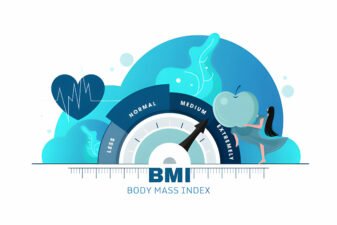Calorie-counting – both of calories-eaten and calories-burned – is not an exact science. Two people of identical height and weight can eat the same amount of food and take the same amount of exercise, yet one might lose weight and the other might gain weight. Why? Because each of us burns up calories at a slightly different speed, and because not all food-calories are used exclusively for energy purposes. Here are some of the factors that influence calorie-usage and thus weight gain.
Genetic Inheritance
Genes have a significant influence on weight gain. For example, some people are born with a faster metabolism; some with a slower metabolism. Genes also affect glands. For instance, thyroxin (produced by the thyroid gland) speeds up the metabolic activity of the body. The more thyroxin produced, the higher your metabolism. If too much thyroxin is produced (a condition known as thyrotoxicosis) metabolic rate can actually double. While people who suffer from an under-active thyroid (hypothyroidism) typically experience frustrating weight gain until their thyroxin levels are corrected by medication. Like thyroxin, adrenaline also increases metabolism but to a lesser extent. Genes also affect thermogenesis, as well as other cardiovascular organs, both of which influence the number of calories you burn.
Gender
Men typically have a greater muscle mass and a lower body fat percentage. Since muscle requires more calories to maintain, men tend to have 10-15 percent faster metabolisms and gain weight less easily than women.
Age
Metabolic rate is higher in childhood than in adulthood. After 20 years, it drops about 2 per cent, per decade. This is why older people tend to gain weight even though their calorie-intake and exercise routines may not change.
Mental Activity
The length of time per day spent awake makes a difference as we burn more calories when we are awake than when we are sleeping. The level of mental activity affects the use of calories. Our brain, although it is only 2 percent of the body’s weight uses 20 percent or more of total calories burned by our body.
Health
For every increase of 0.5C in internal temperature of the body, the BMR increases by about 7 percent. The chemical reactions in the body actually occur more quickly at higher temperatures. So a patient with a fever of 42C (about 4C above normal) would have an increase of about 50 percent in metabolic rate.
Medications
The use of medications, such as anti-depressants, can interfere with metabolic processes and lead to weight increase. If you are worried about increasing weight as a result of taking a particular drug, ask your doctor for a list of common side effects.
Not All Food Calories Used For Energy Production
Essential fatty acids (EFAs) contain 9 calories per gram, but our body uses them for structural, hormonal and electrical functions rather than for energy. At high levels of intake, EFAs increase metabolic rate and increase fat burn off, resulting in loss of weight. During childhood, calorie containing protein and fat molocules are built into body structures. After injury, proteins and fatty acids are used to rebuild cellular structures and new tissues, rather than being used for energy and the metabolic rate is increased. These examples illustrate that not all calories are used for energy production.
We Absorb More Calories From Refined Foods
Because they lack fiber and bulk, high calorie refined foods also slow down intestinal activity. They take up to five times longer to pass through the intestinal tract than do natural unrefined high fiber foods (75 hours compared to 15) and the body absorbs calories during the entire time of their constipated passage.
Non-Nutritious Refined Foods More Likely to be Stored as Fat
Foods cannot be metabolised properly without minerals and vitamins. The energy that empty calorie foods contain becomes unavailable to our body and is stored as fat until (or in the hope that) we get the necessary minerals and vitamins at some later time. In the meantime we feel hungry and eat more. This too turns into fat unless minerals and vitamins are also provided.
Summary
Although the calorie equation is a convenient and instructive way of assessing the effects of eating and exercising on our weight, it is not a perfect system. Weight gain (or loss) can occur for a variety of additional reasons.










